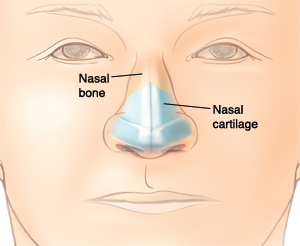Based on your exam today, you have swelling and a bruise (contusion) in your nose. You likely have pain and nasal stuffiness. You may also have bleeding from the nose. By tomorrow, you may have bruising around your eyes. A minor break (fracture) of the bone or cartilage may also have occurred. This generally isn’t serious. It's treated the same way as a bruise. A nose bruise will heal in about 1 to 2 weeks. A minor break will heal in about 3 to 4 weeks.
If your nose looks crooked after the swelling goes down, then you likely have a break. A broken bone that changes the shape of the nose or causes trouble breathing may need to be treated by a surgeon. This might be an ear, nose, and throat care provider (ENT or otolaryngologist). Or it may be a plastic surgeon. They can straighten the bones in your nose. A nose break isn’t treated until the swelling goes down, so the surgeon can see if the nose is back in position. For a break with bones out of place, surgery to put the bones back into place (reduction) should be done 6 to 10 days after the injury. In children, it should be done 3 to 7 days after the injury. After that time, the bones get harder to move back into position.
Home care
-
You can keep doing most daily activities. But be careful when doing them. Try not to lift anything heavy unless your health care provider says it's OK.
-
To ease pain and swelling, put a cold pack on your nose for 15 to 20 minutes at a time. Do this every 2 hours the first day. Then reduce to 3 to 4 times a day for the next 2 days. After that, use it as needed. To make a cold pack, put ice cubes in a bag that seals at the top. Wrap the bag in a thin towel. Don't put it directly on your skin.
-
Keep your head raised (elevated) to help reduce pain and swelling.
-
Tell your provider if you're taking aspirin or blood thinners (such as warfarin). These medicines make it more likely that your nose will bleed. Your dose may need to be changed.
-
To control pain, use medicine as advised by your provider. You may be told to use over-the-counter ibuprofen or naproxen. If you have ulcers or bleeding problems talk with your provider before using these medicines.
-
Don’t drink alcohol or hot liquids until your provider says it's OK. These can open (dilate) blood vessels in your nose and cause bleeding.
-
Don’t blow your nose for the first 2 days or until your provider says it's OK. After that, do so gently to prevent bleeding.
-
Don’t play contact sports for the next 6 weeks or until your provider says it's OK to do so.
Note about concussion
Because the injury was to your head, it's possible that you could have a mild brain injury (concussion). Symptoms of concussion can show up later. For this reason, be alert for symptoms of a concussion. Get emergency medical care if any of these develop over the next hours or days:
-
Headache
-
Nausea or vomiting
-
Dizziness
-
Sensitivity to light or noise
-
Abnormal sleepiness or grogginess
-
Trouble falling asleep
-
Personality changes
-
Vision changes
-
Memory loss
-
Confusion
-
Trouble walking or clumsiness
-
Loss of consciousness (even for a short time)
-
Inability to wake up
Follow-up care
Follow up with your provider as advised. If you were referred to a surgeon, make that appointment soon. Be sure to see a surgeon if your nose looks crooked after the swelling goes down. Or if it’s still hard to breathe through 1 or both sides of your nose. If you have trouble getting an appointment, call your regular provider.
When to contact your doctor
Contact your provider right away if:
-
You're bleeding from your nose even after you've pinched your nostrils together for 15 minutes.
-
The swelling, pain, or redness on your face gets worse.
-
You have a fever of 100.4ºF (38ºC) or higher, or as advised by your provider.
-
You have chills.
-
You can't breathe from both sides of the nose after swelling goes down.
-
You have sinus pain.
Call 911
Call
-
You have trouble breathing or shortness of breath.
-
You have a headache or dizziness that's severe or gets worse.
-
You have a seizure.


